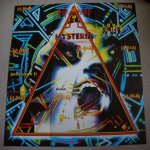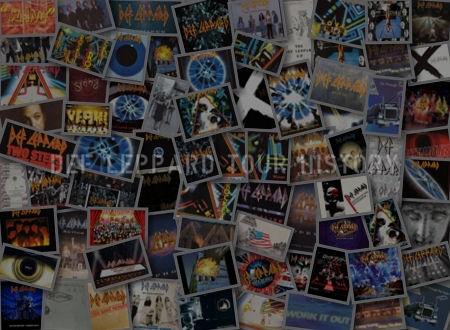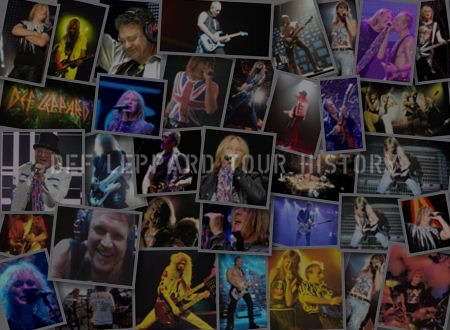DEF LEPPARD's HYSTERIA Album 30th Anniversary (Making Of Special)
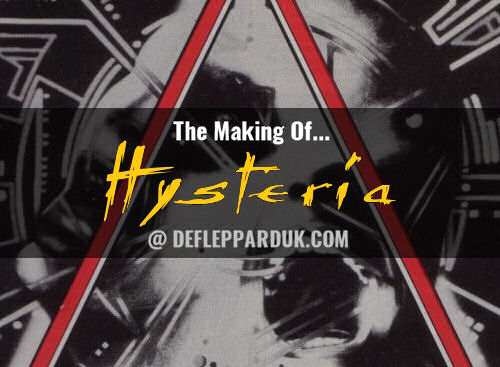 Hysteria 1987
Hysteria 1987
Def Leppard released their classic Hysteria album on 3rd August 1987 and this special feature charts the making of their most successful release.
The band's biggest selling album started out life in February 1984 after the year long Pyromania world tour had ended in Bangkok, Thailand.
The band members relocated to a house in Dublin, Ireland by the coast and set about writing the songs for their fourth studio album. An album they had initially planned to start recording in June 1984 with producer Robert John 'Mutt' Lange.
Things didn't quite go according to plan. A series of mishaps, false starts, recording issues occurred over the next three years. The biggest misfortune happened on 31st December 1984 when drummer Rick Allen lost his left arm in a huge car accident just outside of Sheffield.
It cost almost one million pounds to make, spawned 7 hit singles around the world and has since sold over 20 million copies.
This feature covers the writing and recording process that took place between February 1984 and the albums eventual release in August 1987.
Read the tragic and ultimately triumphant story of the album below with many rare band quotes arranged in chronological order.
This update contains a full transcript of the October 2013 90 minute Scuzz TV interview with Joe and Sav reflecting on the writing and recording of the album.
Note - as you can see this page looks a little different and is a preview of something new coming soon. A new website which (like the music on 'Animal') will (bit by bit) replace the current one.
get def leppard news
Stay in touch with the latest updates.

FOLLOWING UP PYROMANIA
Did it add any internal pressure?
Joe Elliott - "Yeah I suppose it did but not something that you'd outwardly notice. I mean obviously when we'd get together it's like; 'Well that's gonna be a tough one to follow'. Because you don't just sell six million records everyday you know what I mean. We'd achieved what we wanted to achieve but I suppose it's a case of careful what you wish for sort of thing. But when you're in a band I think that you're fortunate enough that you've got four or five other people around you. Unless you were The Police and you've only got two. Where you know it's not all on you. You're just part of the process. You're Mr. 20 percent in this particular situation. So you just keep coming up with your ideas. I mean at the end of the day, all it does is it puts you at a better platform selling six million records. As long as your next record is good."
Rick Savage - "You've already got a tailor-made audience."
Joe Elliott - "They're waiting for it."
Rick Savage - "So there can be pressures in one way but in other ways it can relieve a lot of pressures. I mean god, we'd just sold a stupid amount of records which is something we always wanted to do. So it was like, it was an opportunity more to continue it rather than worry about; 'Oh god, will the next one match up?'. Never really worried about that."
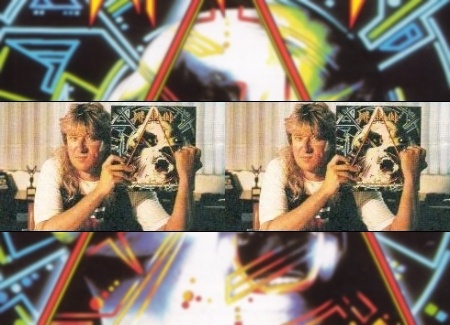 Joe Elliott 1987
Joe Elliott 1987
1983 Pyromania Tour/Album Success
Joe Elliott - "During like that six months of when it was. We started here in London. February '83 at The Marquee. 600 people and we finished six months later in San Diego in front of 55,000. I mean it was crazy. We did a couple of gigs in Hawaii which was more of an excuse for a ten day holiday. Four days off, two gigs. And then we came back down to earth by doing a European tour where the record hadn't sold you know. So we went from 55,000 to about 1,200. Somewhere in Stockholm or something you know. It was a mad time."
"That whole summer in America was incredible. By the time we got there opening for Billy Squier, Photograph was already flying up the charts. And truth be known, and he's admitted it himself in the press, when we did the Billy Squier tour they weren't coming to see Billy Squier, they were coming to see us. And then we started to headline and it just exploded around June or July. It just went through the roof and you know you'd be picking up Billboard magazine and and there'd be an advert, nothing to do with us it was the promoters who put it in, saying the two gigs that we did in Detroit sold out faster than the last time Zeppelin had played there. It really was just a crazy time."
Did you want to put something together that defined staying at that level?
Rick Savage - "Absolutely yeah. Fair comment. It was at a point where we were like. You know what, not only can we reproduce the sales if you like. We weren't that obsessed with the sales part of it but it was more like just branching out but still keeping within your - within the rock confines. And we still thought there was more to explore. We'd done a lot on Pyromania but it was still essentially a Heavy Metal album. That was, you know, just had great production, great songs. On the Hysteria it was more like, still keeping the rock feel but you know just working on melodies and just trying to create an album that nobody had ever sort of done within the rock field."
"We were kind of inventing our sound at that point and it was becoming our identity. And we just wanted to explore that even more, you know, and that's what the, it wasn't such a question of like trying to outdo the last album. Although that is kind of part of it, you're not really conscious of it. You're just conscious of trying to create even better songs. I think that was the motivation."
Did Phil Collen change the band's sound on Hysteria?
Joe Elliott - "Quite probably 'cause when he came in on Pyromania I was really the only guy that knew him. I'd been hanging out with Phil for a couple of years. When Girl played Sheffield he'd stay at my house 'cause they couldn't find their hotel. And so you know I kind of tried to get Phil in the band in '81 and it didn't work out. And then in '82 when we really had to get rid of Pete. We just literally asked Phil to come down and join the next day. And of course management were like, hang on a minute let's just see how it works out. And he came in to the studio and we sent him home with a cassette of Stagefright I think it was."
Rick Savage - "Just to play the guitar solo. The track was done."
Joe Elliott - "Yeah the track was more or less done. You play the solo. So he went home and worked out a solo. Came in and he recorded it in about 15 minutes and Mutt came out the control room going; 'You gotta keep this guy'. But it was nice the way that is worked out. He obviously became - he still to this day says we never actually officially asked him to join. But he was on board from that moment onwards. He played half the solos. Steve played half of them. The backing tracks were all brilliantly done by Pete Willis. In fairness to Pete. And he just became the guy that was from now on gonna be the guitar played on that side of the stage."
"So he did the whole tour. By the time we started writing for Hysteria he'd been in the band maybe nine months. So we all knew him. We'd bonded. We'd well bonded by then. He brought in a totally different style of writing to what Pete did. And we were never really big on that kind of funk. I mean I'm a fan of Pat Travers, the first two albums. But I didn't really want to be in a band that played that kind of Bluesy stuff. Steve's chops were much more. Or Sav's songwriting were much more the direction I liked us going in. But when Phil joined that cemented all that together because we turned into much more of a kind of a pop rock band. You know we were never afraid to play chords. It didn't have to be riffs all the time which don't give you much scope for melody. So it was handy enough that that's where he was coming from as well."
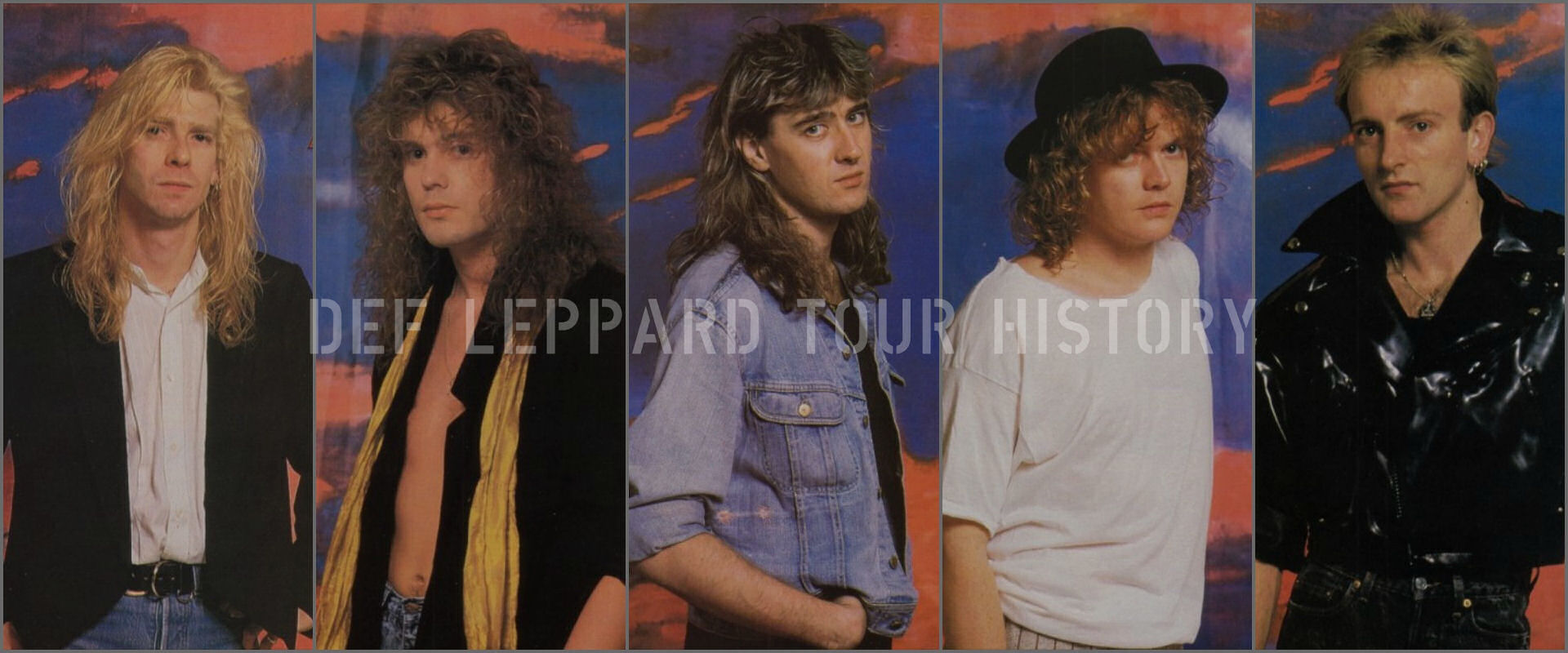
WRITING THE ALBUM/PRE-PRODUCTION - Dublin, Ireland February-August 1984
The band relocated to a house on St. Helen's Road in the Dun Laoghaire area of Dublin (just by the Irish sea) to start writing songs for the new album. For the first few weeks the band all lived in a house together and started to drink heavily. Many songs also got written including 'Animal', 'Women', 'Don't Shoot Shotgun' and 'Gods Of War'. Demos were recorded in a rehearsal studio with Rick playing an acoustic drum kit.
Mutt Lange spent ten weeks with the band writing and arranging songs and during that time said he could not commit to producing the album itself. A blow to the band who would now have to search for a replacement.
Band Quote Early 1984 - "After Bangkok, we will retire to Ireland to begin writing the fourth Def Leppard album. Sometime in June, we then begin to record the album with our trusty producer, "Mutt" Lange, somewhere in Europe or the Caribbean. Hopefully, it will be out in January 1985 and then we'll do it again."
Joe Elliott 2012 - "We were just enjoying the fruits of our labour. We had a bit of money coming in. Everybody was buying a car and you know we were just drinking way too much. It was like 'Oh I can't be bothered to write a song today, let's go to the pub'. But eventually the riffs started coming."
Joe Elliott 1987 - "It was the first time in the five years that we'd been together that we had time to think. And it's only when you've had time to realise that things do go wrong now and again. When everything's up like it was in 1983 you don't really care - you don't notice it. But then a few things happened to us."
"While we were in Dublin, the first difficulty was that Mutt Lange, our old producer, wasn't available. But we settled on Jim Steinman and moved to the recording studio in Holland. But Jim was no good for us and we parted company, so the next problem was 'what the f**k do we do now?'."
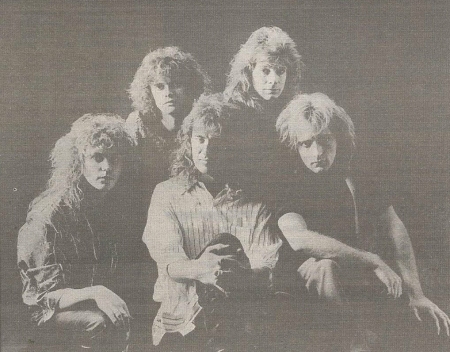 Band 1985
Band 1985
Hanging Out With Other Bands
Joe Elliott 1987 - "We used to share a table down the Pink Elephant, a club in Dublin, with Spandau Ballet when we were both living there. We played soccer with them as well. It was a charity thing and we won it and there were 700 kids there screaming for Spandau because they didn't know who we were. It was brilliant!. We were a wonderful soccer team. We also used to go round their house and listen to records and stuff. And the same with Frankie Goes To Hollywood - they were over there or five months. It's a good nice little scene over there. We drunk The Frankies under the table. Ooooh yeeeeeees!."
"This sounds as though we were doing it every night, but it was only every third or fourth Friday. You'd finish work at about 11 o'clock, go straight down the Pink Elephant, and what do you know?. They're already there."
Rick Savage 1987 - "We thought they'd be obnoxious bastards because of what you read in the papers, but when you meet them they're really nice people."
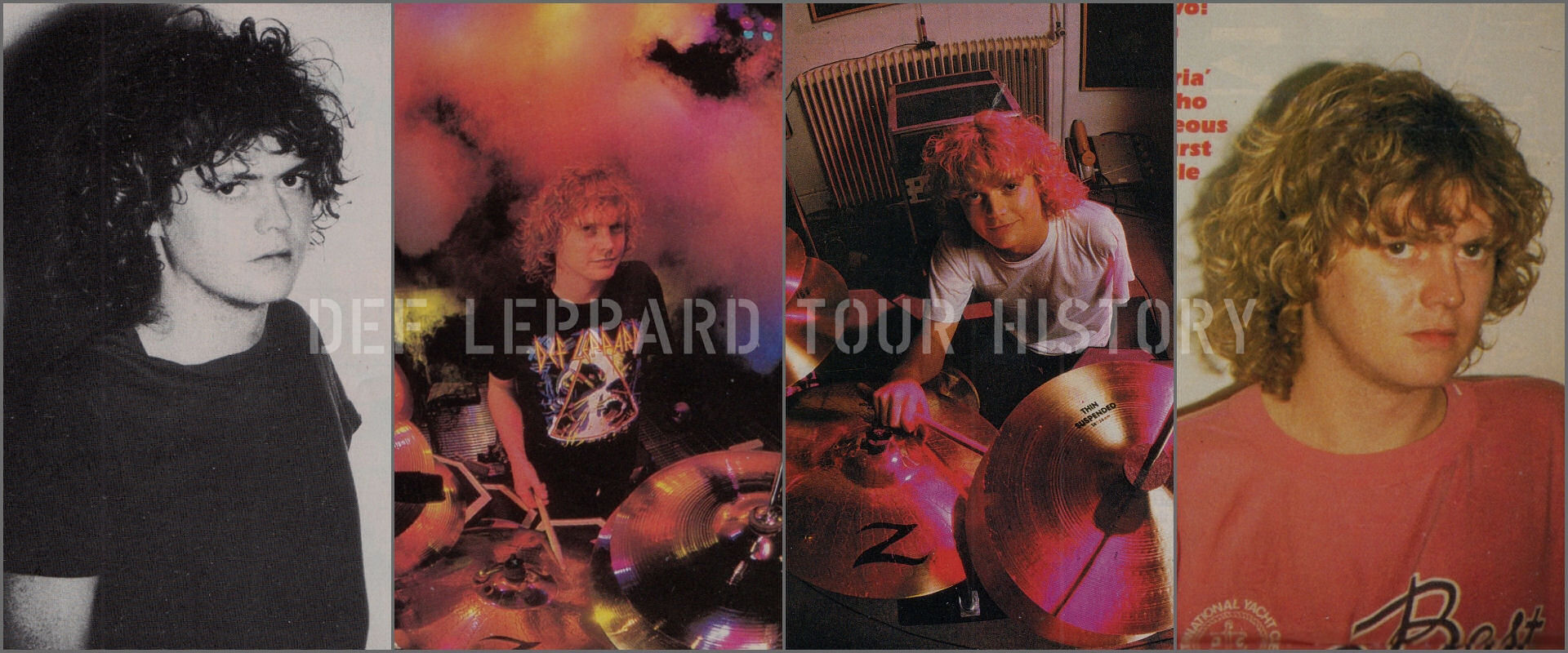
Writing The Album In Dublin/Excess?
Joe Elliott - "Oh yeah!."
Rick Savage - "There was actually some good stuff came out of that writing process but you look back and think; 'How the hell did that happen?'. You know there was a lot of - you name it."
Joe Elliott - "It was all there."
Rick Savage - "It was a period of time where, if anybody can remember, The Young Ones and Comic Strip were just coming out on Channel 4 and everything and it was like and that was us!. We were just isolated in this one house. The whole band and a couple of roadies and that was it. You know we were like, this is where we were and this is we're supposed to be doing. And like, you know what, it was just like a full on house party. Or it seemed that way for six to eight weeks."
Joe Elliott - "But it was great."
Rick Savage - "It was yeah."
Joe Elliott - "We did get a lot of work done. It's not like we didn't work but it was one of those things where we'd just finished the tour. We'd finally cleared off our debt and we actually started earning a bit of money so we could actually afford to drink. That was the problem!. And you know we'd get up in the morning and somebody would be cooking bacon and eggs or whatever. Normally Steve in his Japanese dressing gown. And he'd be like fag in his mouth. It was hilarious really and there'd be a bit of breakfast cooked and it's like some if us would got for a jog and some of us would just go in the back garden and throw up you know. We'd go in the back room where we had this little Fostex 4-track set up to start doing a bit of writing. And we'd be scratching our heads; "ahhh, it's 2 O'clock, ahh let's go to the pub'. And then you know one of the roadies would go off to the supermarket and come back with like a case full of beer. And then you know it's like oh let's go and watch Telly."
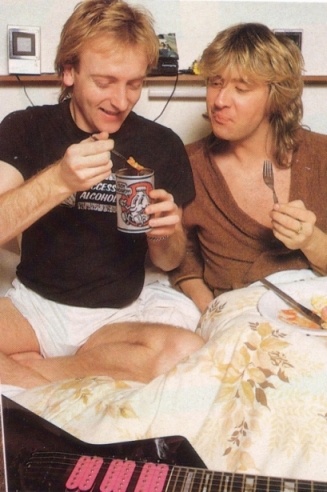 Phil/Joe 1984
Phil/Joe 1984
"A lot of things happened while we were in Dublin. We watched Tommy Cooper die on stage for example. You know it was on TV live. Like Sav says we were watching The Young Ones. We were watching, you know, we were all living in a house. I mean we went to this crappy little shop in Dublin and bought all the furniture ourselves just 'cause it was an empty house. We just rented it. I think the idea. Our management had this idea of like don't let it go to your heads. So they put us in this dump. You know, we couldn't get our of there quick enough and we went pretty much to The Punchbowl everyday or drank in the house you know. It got a bit daft in the end. I ended up moving out and bought an apartment because it was just getting silly. It was the day I think that Phil and Steve went into town and accidentally bought very expensive Rolexes that they didn't know they'd bought until they woke up wearing them the next morning. And tried to take them back and they wouldn't take them back 'cause the guy's on commission. And that's when Phil said; 'I think I'm done' and that's when he pretty much stopped drinking. Well, he tried to stop. That's the first time he tried to stop."
"But we did amongst all that six months of debauchery, did write a lot of the songs you know. Women got written. Most of Armageddon It got written. Animal got - the original version of Animal got written. It was a different backing track to what ended up on the record but essentially the song was the same."
Rick Savage - "Gods Of War. Don't Shoot Shotgun was written there as well."
Joe Elliott - "Gods Of War. As well as songs that didn't make the album that made like Retro-Active five or six years later. Things like Fractured Love. The song called Desert Song. The music was done for it. That was all written. We wrote about 12 or 15 songs which by the time we went to Holland in August of '84 to start recording it. We had, I'd say more than half the album written."
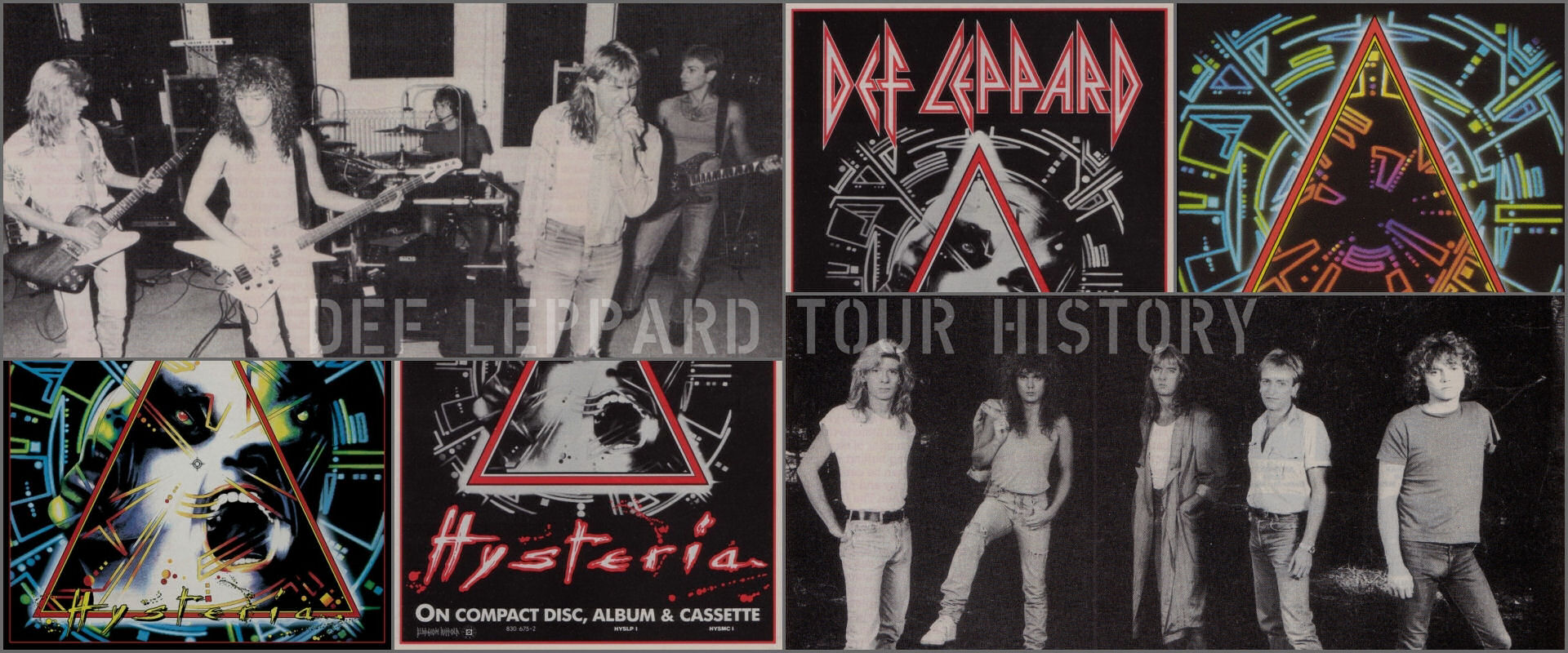
RECORDING SESSIONS START - Holland August 1984
At Wisseloord Studios in Hilversum, Holland (The Netherlands). A few miles south east of Amsterdam. The studio is situated in a woodland area surrounded by many lakes. The region is called "Het Gooi" (Het Roy in English) and known in Holland for being "the home of the rich and famous". The band stayed on the shore of a lake in nearby Oud-Loosdrecht at the Princess Hotel. The sessions began with producer Jim Steinman and engineer Neil Dorfsman (who would later work on Dire Straits 'Brothers In Arms').
What was wrong with Jim Steinman?
Joe Elliott 1987 - "We did some tracks with Jim Steinman that were useless, so we scrapped them."
Rick Allen 1987 - "On the face of it it actually looked as though it would work out. But he's one of these producers that will sort of. He won't wipe anything. He'll sort of see some kind of quality on whatever you put on tape. Which, for the way that we work, it just didn't really come together. It was basically a bit of a wrong combination I think. I mean no disrespect to Jim Steinman because obviously he's been very successful with Bonnie Tyler and Meatloaf. But it just wasn't right for us. It was obvious from very early on that our standards were quite a lot higher From a performance point of view, from a sound point of view, from a tuning point of view."
"And I think he basically wanted to come in. Get the album finished pretty much as quickly as he could and then disappear and do other things. Whereas we, after doing something like Pyromania, we thought well, we really do need to make something a little bit special here. That is basically what went wrong. We were at different, you know, we were looking at the record from different angles. We were looking at it from sort of coming off the slipstream from Pyromania and he was just sort of looking at it. Obviously it was his first album that he'd done with us. So it didn't really work out."
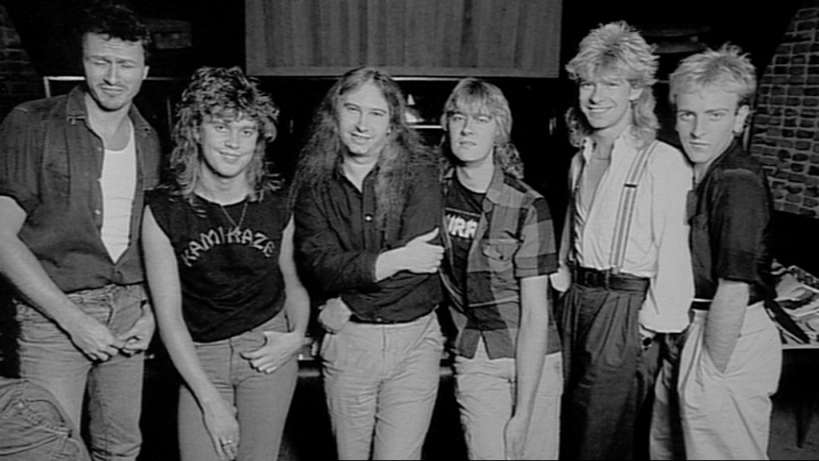 Jim Steinman @ Wisseloord 1984
Jim Steinman @ Wisseloord 1984
PRODUCER JIM STEINMAN FIRED - NOVEMBER 1984
Joe Elliott 1988 - "The main problem with 'Hysteria' was us dicking around with people like Jim Steinman. That's what really took the time. Once Mutt got involved it went pretty quick."
Joe Elliott 1988 - "His work ethic was all wrong. We'd turn up at the studio at 11, and after the coffee we'd want to get started. He would come in at half-past-two, then tell Phil to play something more 'oily'. Phil was saying: 'What the hell do you mean?'. Then when he finished with us at 11 he went away and started writing Bat Out Of Hell II. We were trying to be very focused, and he was sleeping in because he was thinking about Meatloaf's next album. We were paying him just to turn up. Then when he tried to have the carpet changed because he didn't like the colour, that was the end of it. It was always going to happen."
Steinman was then bought out of his contract by Q Prime.
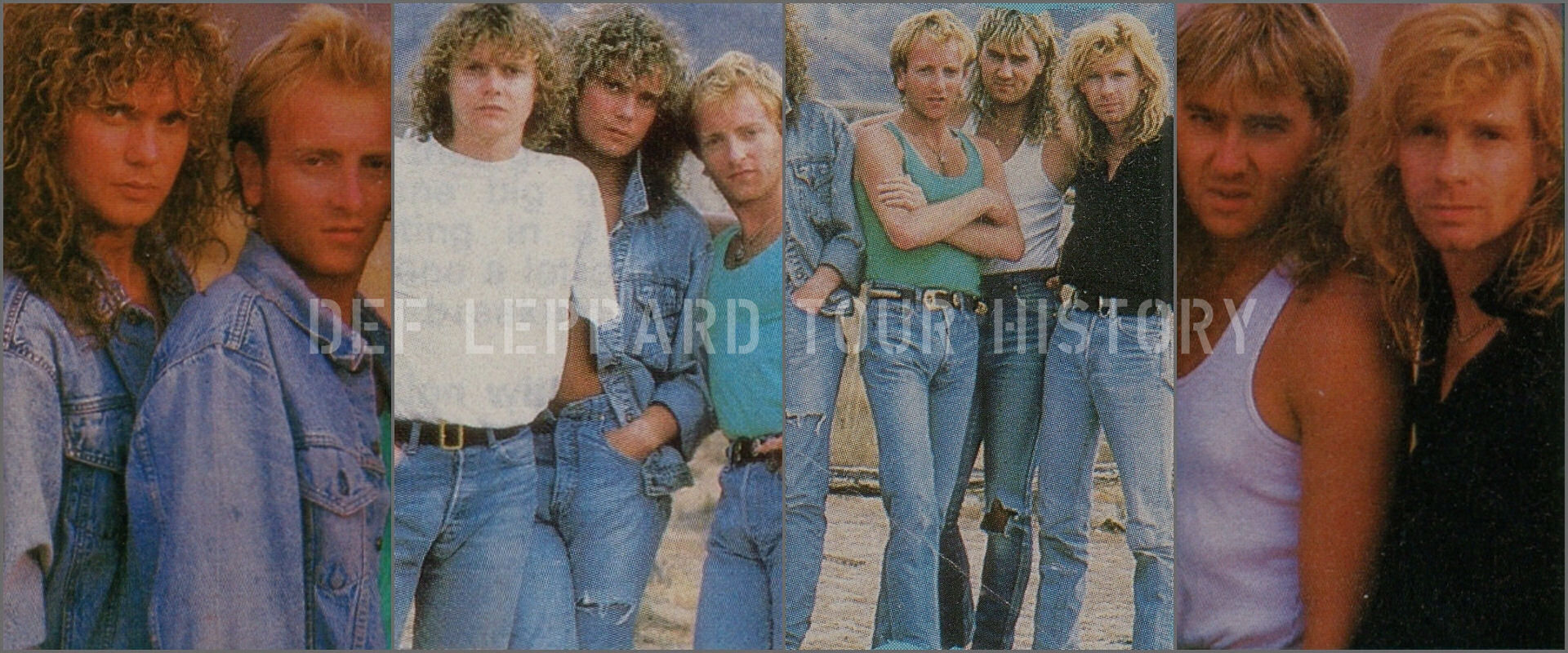
CO-PRODUCING WITH NIGEL GREEN/RICK ALLEN'S CAR ACCIDENT - December 1984
Joe Elliott 1987 - "We'd literally been in the studio for two weeks when Rick had his accident."
Cliff Burnstein 1985 - "Rick and a female friend were driving shortly before one o'clock in the afternoon in his Corvette Stingray. The 'vette hit a wall, and unfortunately, Rick was thrown from the car. His left arm was cleanly sliced off at the shoulder while his friend was trapped in the Corvette. Rick was in surgery for more than ten hours, and for a day or two we thought we would have a miracle. But it was not to be. The doctors knew it was useless so they amputated. It killed us, it really did. But making sure Rick survived was the most important thing. Thank god he'll make it."
Joe Elliott 1987 - "We all tried very hard to save face, we were all smiling and laughing at each other, trying to work. But it was very difficult to concentrate on what we were doing. We ended up going through nine of 10 months of lethargic nowhereness."
Joe Elliott 2012 - "There's no rulebook for "your drummer just lost his arm". You don't know how to react to it 'cause you've never heard the phrase. There's a little bit of recognition like 'well, that's his career over and done with.' So we went back to Holland where we had to fend off half a dozen phone calls going 'Dude, I hear your drummer's lost his arm. Er I'm available'. Just two words is all they got. The second one was off."
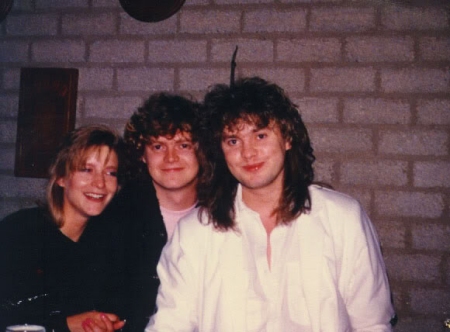 Miriam/Rick/Sav Wisseloord 1985
Miriam/Rick/Sav Wisseloord 1985
Rick Allen Back In The Studio - February 1985
Phil Collen Summer 1985 - "Rick came in one day and played 'When The Levee Breaks' all the way through. The guy had done it!. From then on it was like a massive weight had been lifted from our shoulders."
Joe Elliott 2012 - "He came in one day and said I want you guys to come and listen to something. So we all toddled off into this little room. Kinda thinking oh what's gonna happen here. And he started playing When The Levee Breaks by Zeppelin. And it was tear jerking. It was an absolutely outstanding moment. I mean just something I'll never forget. It helped change the sound of the record because truth is he's actually a better drummer now than he was before."
"I think he just needed to be around his mates. He just needed that more than he needed a doctor and he could of either seen shrinks or just jumped back in and got on his kit. Which is where his love was."
Did you despair after your accident or did you know instantly you would continue?
Rick Allen 1987 - "I don't think I really knew the full extent of what had happened to me, because for a start I can still feel everything now. It's like fingers and you know. And at that time when I first woke up it was like I didn't really understand exactly what had happened to me but it sort of came home to me quite quickly. After a matter of days, maybe a week at the most and I think I was realistic enough about it. I think other people were supportive enough to sort of bring me out of any kind of depression. Obviously I'd love for people to see me on stage and sort of think; 'Now, there's a guy!'. You know. I mean all of us, yourself, you would probably think the same way if somebody looked up to you for for some reason. It's It's just that because I've got one arm and I play drums it's just - people just focus in on that. It's like I was saying the other day I suppose it'd be the same if I had three arms."
Joe did you and the rest of the band ever think that this is the end?
Joe Elliott 1987 - "Nah. If we'd have thought that we would have thought that when Pete Willis left. No disrespect to Rick, if he couldn't have carried on, we would have done. But it's all hypothetical because we knew he could carry on. We never made a decision that well, this is it, we've gotta get another drummer. If Rick wasn't gonna be in this band any more it was his decision not ours. As far as we were concerned he was still in the band."
Rick Allen 1987 - "At the same time I was saying; 'Well, I'll leave it up to the band, it's their decision, I don't...' You know I'll play the drums if they want me to. It was kind of a telepathy thing. I think we all realised that we could carry on the way we always had done. And now it's to a point where there's not really any difference. Like Joe still does the same on stage. He doesn't focus any kind of attention on me. You know there's no favouritism or whatever. Simply because I've only got one arm. I think it's just very natural because we're so close."
Do you think this has welded you even closer together, this past three years?
Joe Elliott 1987 - "I would say so yeah. I'd say it probably did but we were very close anyway. I mean it's made us closer but we couldn't have got much closer. We've always been a tight outfit. We've always been, on stage and as human beings, we've always been very close. We were living in the same house in Holland. We lived in the same house in Dublin. We'll probably be living on the same coach when we go out on tour. And we'll be in rooms next to each other for the rest of us lives. Rest of the band's life. And it's good because we're each us own best friends you know."
"It's very nice to know that when you're on tour although you can't be - it's nice to know that we can all rely on the fact that we're there if you need each other. You've got you're own room. You can be on your own you know, but if you need company or you wanna talk to somebody of go for a game of soccer or just go and have a drink. It's just a phone call or a knock on a door. And you need that because when you're away from home a lot and working the way we do. Which is touring and albums and touring and albums you need that kind of company. You need that stability of knowing that there's a strength there in the band, because if it's there off stage it's there on stage."
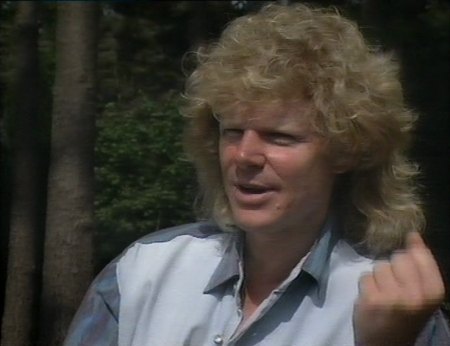 Mutt Lange 1989
Mutt Lange 1989
Mutt Lange Returns As Producer - Spring 1985
Band Newsletter Quote 1985 - "Well, Mutt agreed to be Executive Producer, which means that once we finish recording drums, bass, guitars and Joe finishes singing. Mutt will add any final touches and mix the record. His return has given us new energy and we are convinced that the album will be TOTALLY AWESOME!!!."
This led to Mutt coming back on board as the main producer and another 18 months or recording/mixing before the album was done.
At this time they had 10 songs for the 'Animal Instincts' album. Two of which were dropped by Mutt - Fractured Love and Ring Of Fire. PSSOM, Love And Affection, Rocket and Hysteria were not yet written as of Spring 1985. The last three were written by summer 1986 with PSSOM as the last song in late 1986.
Joe Elliott 1987 - "We kept doing it again and again. We didn't like this and we didn't like that. The album we were putting together wasn't as good as the last, so we just didn't release it. The decision cost us a lot of money, but we don't care. It's the final product that counts. I'd rather go down in the history books than the profit and loss columns."
The band moved to Paris in the summer of 1985 with Joe recording vocals as the rest of the band rehearsed for a tour that was to start in late 1985 after an album release.
Rick Savage 1988 (on Mutt Lange's influence) - "It's difficult to answer really, cause apart from one other producer (who did the first album) we've never really worked with anyone else. No disrespect to Jim Steinman, who we spent a few months with. He basically was just there in body. He wasn't doing anything for us, and so, we never really knew what producers do with other bands. You never really know how much input they have with that band, so it's difficult for us to compare. Mutt does get himself involved with the band quite a lot, and his production techniques...some people will hate him while he puts you through it, but they always sound good at the end of the line. He has an influence on us to a certain extent because he'll turn around and say, "That's crap," or, "that's good, we should use that," and we respect his judgement."
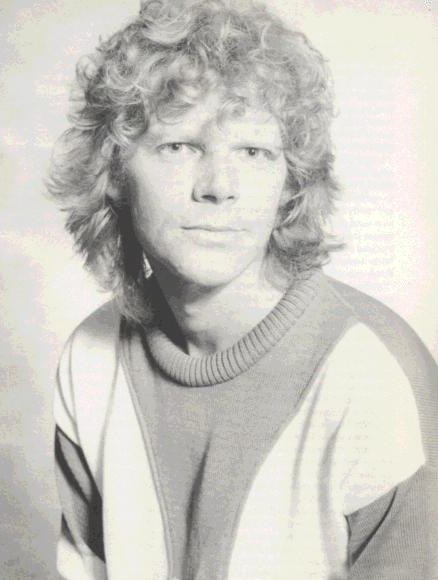 Mutt Lange
Mutt Lange
Joe Elliott (on Mutt Lange) - "The one thing that Mutt is good for is that he's a very positive thinker, he won't let the word "can't" exist. He's rubbed off on us a lot. Nowadays, especially with what Rick's gone through and managed to do, the word "can't" definitely isn't in our vocabulary. Mutt will say, "this song could be potentially the best song ever written. It just needs a bit more work on it. Yes, the verse is good, the lyrics are good, but the chorus sucks"."
Steve Clark 1987 - "Some of the songs did sound a bit dated. We decided to keep about six of the songs for the album. We totally re-wrote them, but we also kept writing new songs throughout the period we were recording. We eventually ended up with 19 songs altogether and picked the best 12 for the album."
Mutt Lange Not Available To Produce The Album. Did you have any idea how it would affect you?
Joe Elliott - "Well, I think we did but you just have to adjust and if he says; 'I'm not doing it'. You've got no option but to look elsewhere. You know what I mean. There's no way - you can't can't on your knees and beg. I mean they guy, he wasn't not doing it 'cause he didn't want to. He just said I don't think I'm gonna do a good job because he'd just finished doing, I think it was Foreigner 4. No, The Cars album (Heartbeat City) and he genuinely needed some time off. But he agreed to go to Dublin. He stayed with us for. I can't remember how long he was there but we did a lot of pre-production. We tried to get in contact with a bunch of different people. Some of them didn't respond. Some of them said no. One of them, his manager said no on his behalf and he never found out about it (Chris Thomas). When I brought it up with him when I met him, we met at the Classic Rock Awards. This is a guy called Chris Thomas who did The Pretenders and the Pistols. He says; 'I never got asked. Do you think I would've turned it down?. Of course I wouldn't have turned it down'."
"It got suggested, Jim Steinman got suggested and obviously you know by then we just had no choice really."
Were you ever sold on it?
Joe Elliott - "Not really."
Rick Savage - "Not totally, no but the one thing we kept saying to ourselves is that obviously what Jim Steinman did with the Meatloaf thing. Is that it was obvious that he had an idea of how to write a song. And how to you know, how to base a song, melodies and things like that. So at least we were, we thought that we were going with somebody that was musical you know. And we were confident enough at the time that we'd done enough work with Mutt that the songs were in shape enough to do it. So it was like it's just a question of recording it now and as long as we get a decent engineer. Which Neil Dorfsman, who is actually or was a really good engineer, we should be OK."
"So we went to Holland with that intention and that in mind and Jim arrived and you know we started recording and it was just. It was just going in one direction where we though we should be going in that direction."
He didn't share your vision?
Joe Elliott - "Yeah, he was just on a different, totally different wavelength. What Jim Steinman does for other artists probably works great. It's valid, totally valid but again, as Sav says, it was more a case of like with a great engineer, we just wanted somebody that knew what music was. There's nothing worse than a producer that can't play an instrument for example. In our eyes, for the way we were. Mutt could play. Mutt's an, in his head he's a great drummer, but he's physically a good guitarist. He's a fantastic singer and he knows how to write a song. He knows how to produce a song. So we had the best of both worlds. We were hoping that Jim would be like the second best, the next best thing if you like. And it really didn't turn out that way. So after about eight or nine weeks we just had to say this is not working out and let him go."
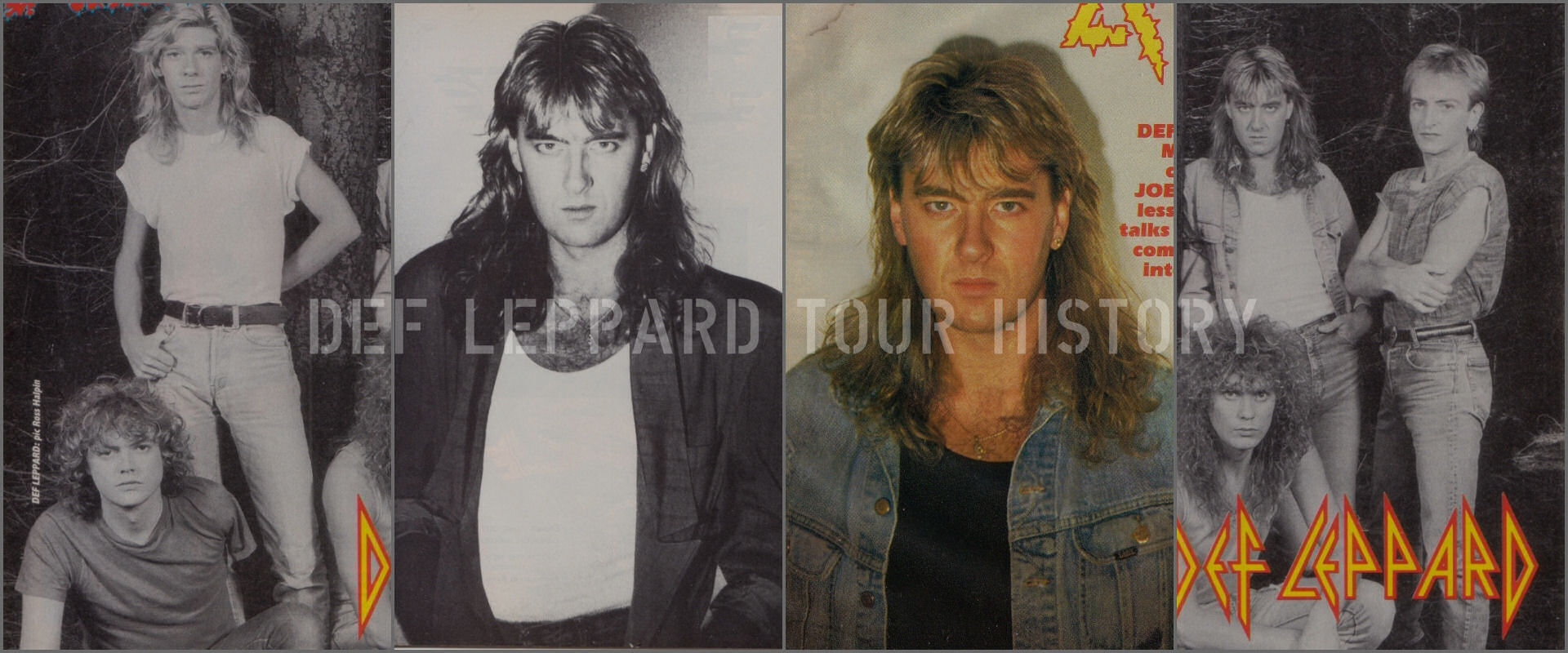
Rick Allen's Accident/Did you get the feeling that Hysteria was a bit cursed?
Joe Elliott - "No. It had hardly started. No, not really. I mean people always go on about us being cursed, it's just rubbish. It's like we've been around for 35 years. Take all the negatives and write it out on a list. Then go outside and get five strangers, bring 'em in and ask them their negatives and they'll be identical but they won't have had the highs that we have. And it was the same thing back then. It's like we started, we fired a producer you know. One guy said he couldn't do it. We fired a producer, we made, you know we recorded the tracks with Rock when he had two arms. We were working on the record. We took a Christmas break, he had his accident. We weren't thinking anything about a curse. We were just thinking about him you know. And then eventually going back in the studio and carrying on because there's nothing we could do for Rick you know. It was up to the doctors and himself to see how he was gonna be, nothing we could do."
"We're not doctors, we're not surgeons. So we could not go back to the studio and sit around twiddling our thumbs just going mad. Or we could go back to the studio and carry on working 'cause we had the drum tracks recorded. So it didn't stop us from doing bass, guitars, vocals. All that kinda stuff. So we went. We just got back to work and let him get on with it you know. Fully expecting him to be away for six months or so and he was back in the studio six weeks later 'cause he'd got out of the hospital, got fed up at home and decided I wanna be over there with the boys."
Rick Savage - "It gives you. It's like - and we've used it very much since then. It's like geez, you know. You sometimes forget what he went through and what he still has to do. And it puts everything more in a perspective. It's like. OK well, if you - it just fires you up more. It gives you a focus that you know. And that's what it did. I mean, we were so focused in what we were doing even if at that particular point in time we were going down a blind alley in trying to get to the right formula for sounding, for the record we were trying to make. But we were so focused in that you know things like worrying about or thinking; 'Bloody hell, we must be cursed'. Or whatever. All the negative stuff. It never permeated our consciousness. We were just heads down and let's you know change this, record that. You know, let's tweak that and it just built and built from there."
Working With Nigel Green As Co-Producer
Joe Elliott - "When we parted company with Jim Steinman we started doing the album ourselves with Mutt's engineer Nigel Green who'd worked on Pyromania and High 'n' Dry. And we were making a very kind of, you know, credible Pyromania II I believe is what we were doing. But you know and then Mutt would make phone calls and middle of 1985. Mutt goes; 'You know, I think I'm ready to come back'. And we were like; 'Oh, thank god'. You know because we wanted him and we needed him truth be known. We didn't have - I mean now days we can make a good sounding record but back then we needed guidance. You know we needed a producer. So when he came back over it totally changed the whole mood of the camp you know. And it totally changed the direction of the record."
"By the time 1985 was in full swing. The Summer of '85 and some of these songs had been written in like February/March '84. We were looking at each other going; 'Well, they're actually out of date'. They're OK for a Pyromania II but we don't wanna make a Pyromania II. So things like Fractured Love got pushed aside. There was this other song, which actually was called Love Bites. It ended up on Retro-Active as I Wanna Be Your Hero. And we stole the title and put it back into a different song. So there's all - things started to move along and change and what Mutt was very good at. All the work that we'd done he didn't scrap. He just one by one replaced bits. He'd say; 'Let's redo that guitar track'. A week later he'd go back to that song and go; 'Let's replace that other guitar track'. And all of a sudden you realise he's replaced the whole song."
Mutt Lange Back As Producer/Redoing The Album Again
Rick Savage - "A classic example of what Joe just saying actually just very quickly is the Animal song. We had a backing track that went in a certain way. It was completely the same chords. We'd not changed the song. It was recorded in a certain way but it didn't have the lead vocal on it. And Mutt said that he would come over and oversee Joe's vocal on it. And Joe recorded the vocal and to me it sounded so good, that it was like. It was a lightbulb that came on, like a defining moment. And what happened with that song is that piece by piece we kept the vocal, and then started either replacing the guitars and bass or just making different parts, guitar parts, underneath the vocal. so that the actual vocal was actually probably the first thing that was recorded that actually ended up on the album."
"But it was just cleverly done because it just got - the foundations brick by brick were just sort of changed after the icing on the cake had already been planted. But it didn't seem like somebody was like deflating you by saying; 'OK, that's rubbish. Let's start again'. It was cleverly done. It was like just bit by bit but by the time we got to the end of it we realised that it's a brand new song."
Joe Elliott - "And Mutt's input on that record was enormous. I mean it's not just the physical side of pushing you to sing better or play better or his ability to twiddle knobs. It's the man management that he was involved in as well. It was the encouragement and the fact that he'd say; 'What do you really think about this song?'. And we'd go; 'It's alright'. He'd go; 'Yeah, I was thinking the same thing. We should write something else'. And what we were always good at was using other people's songs as analogies. And it's like a song like blah blah blah. And we would do that all the time. We'd say; 'We need to write a song that sounds like such and such'. And that puts you in a head space to come up with a song that sounds a bit like something else. And that's how every band starts off. When the Small Faces started they were just doing songs that sounded like what they grew up listening to."
When Sweet and Slade and Bowie were doing stuff they were just writing songs that sounded like what they grew up listening to. So we were just taking it to it's , you know, ridiculous logical conclusion of literally naming a specific song and going; 'We should do something that's mad like this.' You know and things like Gods Of War were just unique. They just are what they are. You know there's no let's do a song that sounds like that. But with Armageddon It for example, there's no way that we weren't gonna acknowledge the fact that it comes from, parts of it. Specifically he guitar riff comes from Get It On by T. Rex. Because we wished we'd written Get It On. So it's like well, why don't we?."
Rick Savage - "It was our version of it."
Joe Elliott - "Yeah and it doesn't sound anything like it. But once I say that and somebody hears that guitar part. The Police specifically round about that period were a massive influence on what we were doing because we were all huge fans of what we call the jangle. And Rush were doing it. In fairness, mid 80s, Rush sounded like The Police. Guitar-wise. And I think Andy Summers' guitar was a huge influence on what we were doing. Between him and Steve Stevens off Rebel Yell. Was the kind of chopiness of the way he plays. They were the things that we were bringing into Hysteria that we weren't doing when Mutt wasn't there."
Were you aware this was becoming a legend in the outside world before anybody had even heard it?
Joe Elliott 1987 - "We weren't aware of it being a legend. We were aware of it being a laughing stock. Which we shall ram down people's throats over the next 18 months. I mean it'll be us laughing at them you know if the thing does anything like in between 4 and 8 million. Which we probably think it can do. I think a lot of people are very naive in the way that they kind of wrote us off. 'They'll never do it' you know 'One armed drummer'. 'How do you follow six million?'. We can and we have and we will. It's silly that people think that we couldn't ever do it again. And that if we spent a long time making a record we'd disappear up our own you-know-whats. But it's not true. We couldn't come out with a good album."
"We wanted to make a killer album and whether it had been legendary of just like the laughing stock over the last three or four years. We weren't particularly interested in either, because we were too busy trying to create a masterpiece. That's what we wanted to do. So you know anybody that's stuck with us and said; 'I know they can do it'. Then, you know, I take my hat off to them. Anybody that can stick through that because I know a lot of people were taking the mickey. But I mean that's just their own stupidity more than anything else. The thing is we made a good record...and they didn't!."
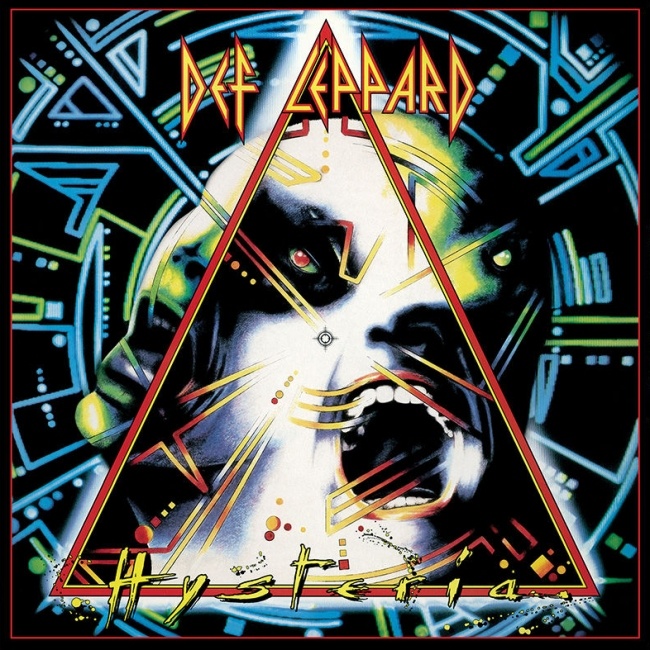
HYSTERIA ALBUM TITLE
Joke Title - "Paranoia". Working Title - "Animal Instincts" - later used for the official biography book "Animal Instinct" which was made during the second half of the album recording in 1985, 1986 and early 1987.
Article Quote 1987 - "Ironically, it was Allen who thought up Hysteria. Collen says the diminutive drummer came up with it while the title track, which was at that stage without a name, was being written. "Steve figured out a musical bit for the chorus, then Rick Allen said 'good words in the newspaper - Hysteria'. So we thought we'd call the album that, and it also fits the song, fills the gaps."
ANIMAL RECORDING/TOUR REHEARSALS - July 1985 Studio Des Dames, Paris, France
Joe Elliott 2014 (on Animal) - "I did the vocal for it in Paris. We went to work in Paris. I remember we were there when Live Aid was on. We were there for Bastille Day. And we worked in this little studio and I did the vocal. We spent a couple of days just experimenting with it and then nailing it down. And then when we took the tapes back to Holland. Where we went to finish the album off. Between Holland and Dublin."
RECORDING IN DUBLIN - June/July 1986
Joe recorded vocals for the album through June and July in Dublin at Windmill Lane Studio 2. He continued recording vocals in between live shows in August 1986 back in Wisseloord Studios in Holland. Rick also recorded drums in Holland in the run up to the August Irish warm-up/Monsters Of Rock tour which the band rehearsed for in June/July.
JOE GETS THE MUMPS/MUTT LANGE CAR CRASH - November/December 1986
Joe Elliott 1987 - "Then I got the mumps. I lost two stone, but got much bigger because you swell with mumps. The day I got back to the studio, our new producer (Mutt Lange) was in a car crash and had to stay in hospital for three weeks with critical leg injuries. It was like the bad luck was never going to stop. Eventually, we said" 'No! We're going to finish the thing.' So we went straight back to the studio and got the whole thing nailed by February (1987)."
Joe Elliott 1987 (on Him/Mutt coming back) - "We came back with a completely different frame of mind. We had a lot fresher attitude, the way it should be when making a new album. We didn't have a problem creating a flow because we were used to taking songs apart and putting them back together again. Every song created is credited to everybody in the band - we all did our bit for every song."
FINISHING THE ALBUM/PSSOM - January 1987
Joe Elliott 2012 (Armageddon It) - "As far as we were concerned, that was the final track. So we were having a coffee break. Mutt disappeared, and I went into the control room and started playing this thing. Mutt comes back and asks what it was. I said it was just this idea I'd got - no big deal. He said: 'That's the best hook I've heard in five or 10 years. We should absolutely do this song.' And, of course, I was thinking there was no way the guys were gonna go for it."
One of the many things that gets me about this is how did you know you'd finished this album after all this time?
Joe Elliott 1987 - "Somebody told me!. I knew because I was the last person in and I sung the very last word that went down. So that was it, I knew it was finished, I couldn't believe it."
Rick Allen 1987 - "Self indulgence eh?."
Joe Elliott 1987 - "It was. It was unbelievable. I wasn't happy. I wasn't ecstatic. I wasn't leaping up and down, it was just like a big sigh. It was one of them you know like a massive sigh of relief. But I mean you know we had our ups and downs which have finished now and we're definitely on an up now."
How many times did you actually record the album and reject it?
Joe Elliott 1987 - "It was sort of, this is like the third attempt, but it was really only one and a half I suppose. We did some tracks, not the whole album, we did some tracks with Jim Steinman that were useless so we scrapped them. And then we started again with Nigel Green who was Mutt's engineer and we scrapped a lot of that but we did keep some of it. And them Mutt moved in on the project about halfway through what we were doing with Nigel. And salvaged some stuff and we started some stuff again. But we hadn't started it all by the time Mutt came in. We'd maybe been six songs deep. So we had six songs started from scratch anyway. So it's kind of three attempts but really only one and a half if you get me drift."
Will the next album take four years?
Joe Elliott 1987 - "I'm not saying that again!. You can cut that bit out of the old interview!. At least I said that we like to take our time and we like to get it right. Which is exactly what we did."
Phil Collen 2012 - "We'd finished the record and we were just winding down. And we'd already spent so long on the album that it was a bit like: 'Oh, f**k. Not another song that's going to take six months.' It didn't of course,. It actually took about 10 days because we were getting the hang of it."
Joe Elliott 2002 - "Armageddon It was the last one. Mutt and I were only ones in the studio. And as soon as I finished doing the last bit of that song, it wasn't so much a feeling of anti-climax as it was an inner sense of being totally relieved. I didn't jump up and down. We didn't hug each other and drink tons of champagne. It was more like 'Oh we're finished, man. This is great.' We shook hands, sat down, looked at each other and we both let out a big sigh."
MIXING THE ALBUM/B-SIDE RECORDING SESSIONS - February 1987
Mutt Lange begins mixing the album which takes four months. At Wisseloord Studio 2 the band recorded up to 7 songs/Some used as B-Sides.
Steve Clark 1988 - "When Mutt Lange phoned and said 'I've finished the last mix, boys'. We were thinking then, 'If we ever get this together, is anybody gonna care?' After all the stuff we went through, it was amazing there were any fans left."
Phil Collen 1988 - "But we got over feeling nervous about it after the first year. We'd blown our momentum, so we were gonna have to do a good album."
Steve Clark 1988 - "We decided, we won't settle for second best. And if it does all fall apart, so what?. Here's a guy who lost his arm and he's still playing. So who are we to complain?. As a band, we're so much better, so much more professional. We were laughing about this the other day. We used to take everything for granted."
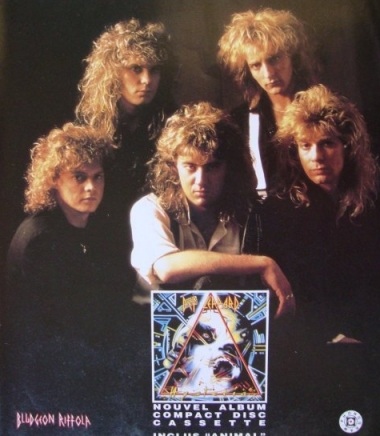
HYSTERIA ALBUM RELEASED - 3RD AUGUST 1987
Joe Elliott 1987 - "Now, after three years...12 songs, 63 minutes. We could have put out a dummy double record and made a lot more money, or we could have left off four tracks and had a 45 minute album, but so what! We're not businessmen, we're just concentrating on being a band."
"The one thing we can never be accused of is flooding the market. I want to be in this band as long as we're not boring old farts. It we're gonna be at it for a long time we're not gonna put a lot of records out. We'll be the only band that's been together 25 years and put out only 8 albums."
Steve Clark 1989 - "For any positive thing there has to be a negative. If people say it's over-produced, f**k 'em. We just made the album that we wanted to make. It took a lot longer than we thought, but we've now sold eight and a half million records in the States."
Joe Elliott 2012 - "When you've spent that long making a record. Whatever got done at the beginning, you tend to forget you've done it!. And you're hearing it as though it's somebody else which was actually quite exciting and very unusual. We weren't that close to it. So we were listening to the album as though it was actually - as fans!. We were listening to it thinking, that's actually us!. Listen to it, that's us."
Phil Collen 2012 - "Love Bites. I remember hearing Love Bites, the finished mix. And I thought this is our biggest shot at a Number One single. And then it came out and it didn't do well initially."
Joe Elliott 2012 - "It opened at three million didn't it?. Which was a massive failure compared to Pyromania."
Phil Collen 2012 - "Yeah, we thought that was as well as it was gonna do. And we was playing kind of half empty arenas. It wasn't great you know. But I remember thinking if it didn't sell any copies at all that we'd be totally satisfied with it because it was the best album I'd ever heard. Until PSSOM came out and then it just kicked it into another stratosphere."
Joe Elliott 1987 - "We're very happy and somewhat relieved. We were a bit concerned that people may have forgotten us, that some new bands might have come along to take our place. We're very happy that people still like our music and we're very excited about the chance to get out on the road again. A lot of new talent has come along, so it's much more competitive out there in the rock world but we love it! We want to come back and prove to everyone that Def Leppard is still the best rock band in the world!."
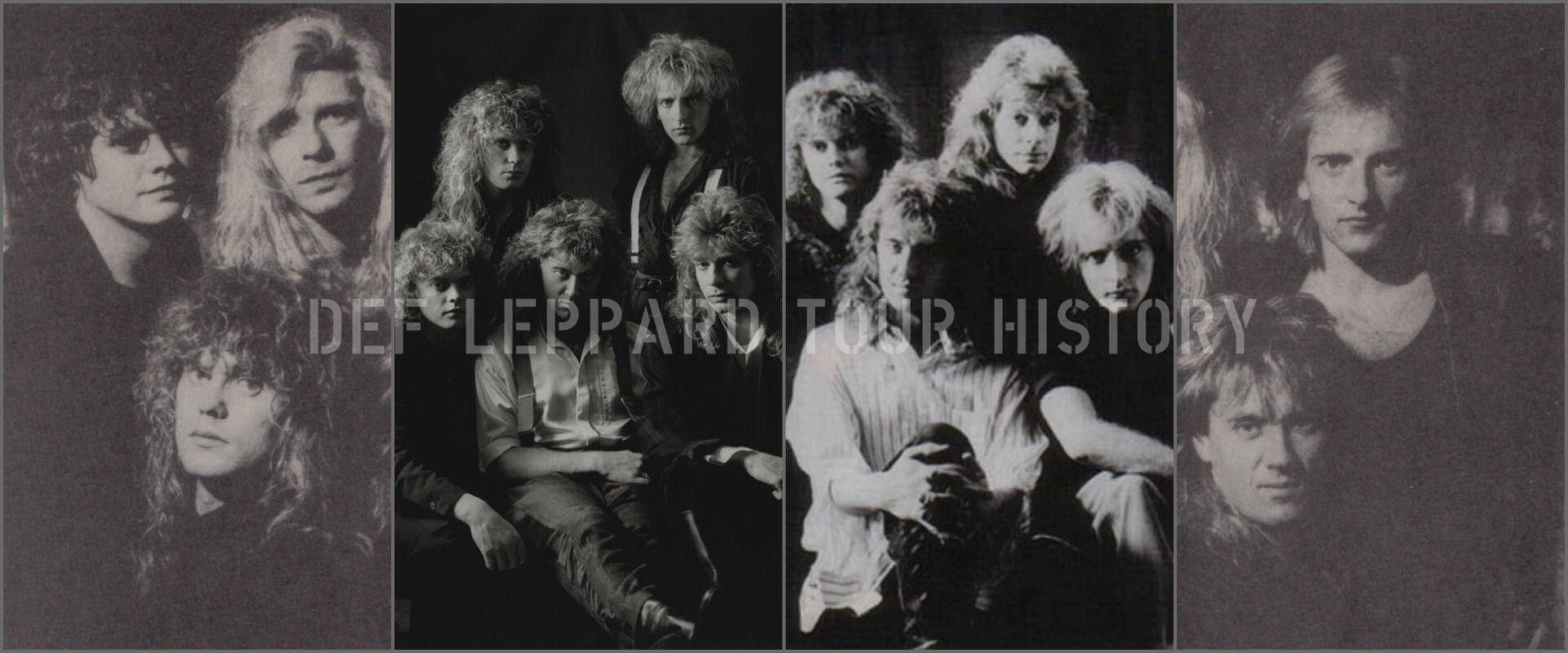
PLANS FOR THE NEXT ALBUM - September 1987
Rick Savage 1987 - "As for the next album...that's one of the reasons we see the band as a long-term project. 'Hysteria' is only the fourth album, and we've been seven years with the record company."
Joe Elliott 1987 - "We've talked about the next album already, but obviously we won't be doing anything for a while as we'll be touring for the next 15 months or so. It's gonna be a case of wait and see what happens. We have a plan, but we're not telling you yet!."
THE HYSTERIA SINGLES
Made up with 5 UK 12" singles/4 12" card flats that came with the Love Bites 12" collector's edition. Two of which were used in the US for 'Women' and 'Rocket'.
HYSTERIA ALBUM COVER ART - Sleeve Design Origin by Andie Airfix (Satori)
Andie Airfix - "It was a typical Def Leppard brief, I was given virtually no information. The album was originally going to be called Animal Instinct, so I created a sleeve based around that. I was into the idea of having something turning around to look at you, so that illustration had an eagle, a lion and a shark which all blended into each other. Then they changed the title to Hysteria, so we had to literally rework things."
"The triangle was a recognisable image for Def Leppard fans, so that seemed a good starting point. Then it was just a case of creating something that was frightening in some respects. The full-on face we used is almost human, but the side view isn't, retaining the animal aspect. The idea was that this thing turning around to face you made it scarier."
"They trusted me; their input was basically limited to saying if they liked an idea or not. Maybe there were a couple of people who didn't like it quite as much as the Pyromania artwork, but in the end they all recognised it was a strong cover, and really suited what the band were trying to achieve musically."
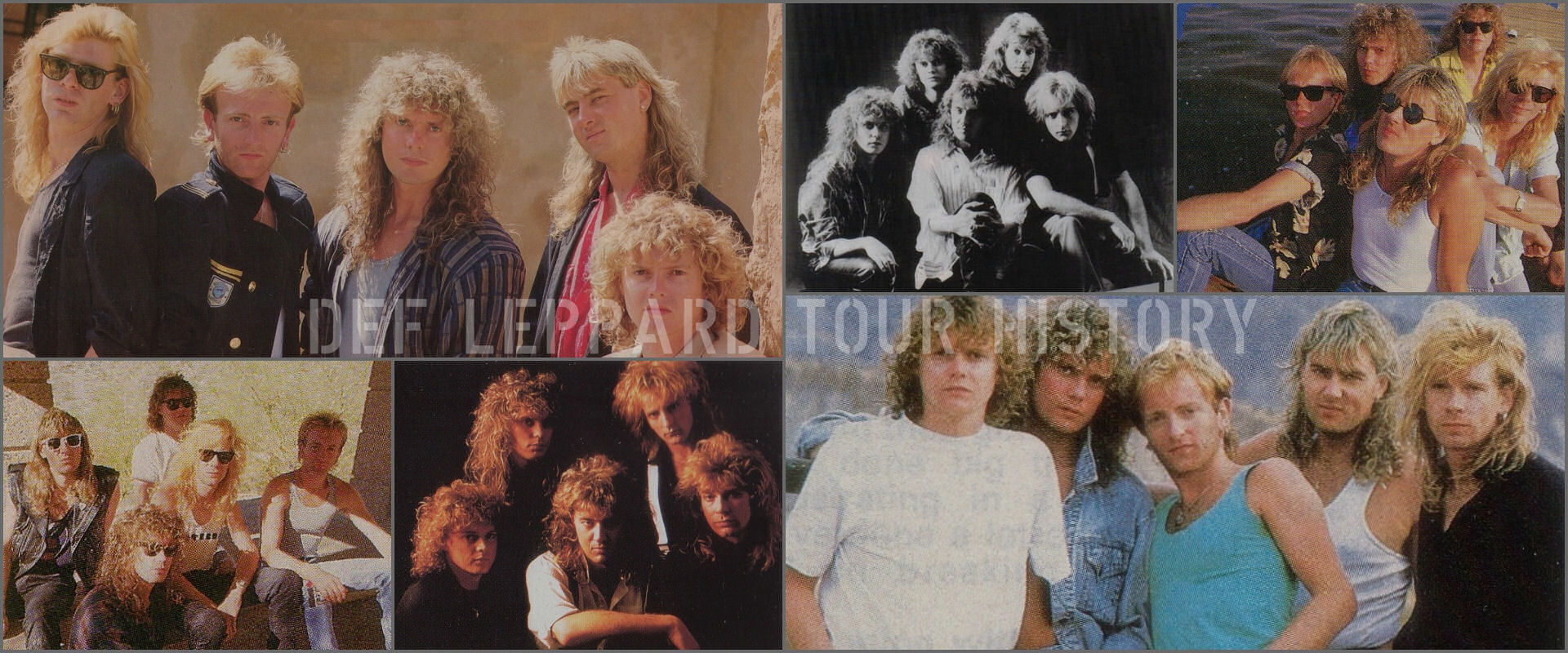
COST OF THE ALBUM
You needed to sell 5 million records to break even? An alien concept in today's world!
Joe Elliott - "Round about. Maybe a bit less...might only be 4. But still!."
Rick Savage - "You'd never really do it. You'd never get there."
Joe Elliott - "But it was the 80s. the 80s were mad!!. Everybody was selling millions of records and you expected Michael Jackson and George Michael and people like Janet Jackson to sell 10 million copies 'cause that's the way the music business was back then. So yeah we knew that we needed to sell ten million because we need to sell at least four to clear off the debt. And then that would put us back where Pyromania was. Basically selling six million. Just keep the thing rolling really."
Rick Savage - "We weren't really. We didn't really pay any attention to that. We weren't even aware that we were. We'd had no idea how much we were spending."
Let's finish the bloody record!
Joe Elliott - "Yeah that's what it was. It was heads down and just get on with the music."
Rick Savage - "See what happens at the end."
Joe Elliott - "And then at the end you go; 'Oh my god' you know. Should have checked the bill beforehand. We wouldn't have made the record if we'd been thinking that way. That's the beauty of it. As daft as it sounds when we spent that much money. Had we been intelligent enough to know. We wouldn't have just gone gung ho; 'We're gonna make this brilliant record'. We'd have gone; 'We can't afford to'."
Rick Savage - "It would have definitely got in the way."
Joe Elliott - "We didn't think that way and it was a good job that we didn't really."
Animal being a hit in the UK must have meant an amazing amount to you?
Rick Savage - "Yeah it meant more than any other record - certainly up to that point. To have a record that was a hit in your own country. Finally!. It was like it was - it meant more than anything that we'd done up to that point in America. Just because it's, this is where we are. This is home. It's Mum and Dad. That's what it is."
Joe Elliott - "And your mates in the pub who finally realise that you're in a band."
Rick Savage - "Exactly. Yeah because they can read about what happens in America but it doesn't really encroach on their reality. But when all of a sudden we managed to become popular in England. 'Ah. so it is true! You can do this'. Sort of thing."
Were you mates reactions pretty mental when you did Top Of The Pops?
Rick Savage - "Yeah."
Joe Elliott - "I'm sure they were. It was ten years almost to the day since we formed when we had our first hit. What was it? July '87. The album came out in August. And we got together what, September ''77. It's was almost ten years you know. And of course you know some of our mates had seen us start and then they knew that we'd got big in America but they never heard us on the radio. Then all of a sudden they heard us on the radio and when you're actually on radio that cements the relationship between the listener and the band. When they can actually hear the thing in their own territory. You know reading about it getting played on the radio is not the same as hearing it on the radio. And we were now finally you know I think the word is accepted in our home country. A genuine hit single followed by a Number One album. Which it came out, it went straight in at Number One the following month you know which was like 'Wow' you know. We've actually got a Number One album here."
Was it a slow burner in terms of the States?/PSSOM
Rick Savage - "Yeah there was a point where it looked like it was just. Like it was just kinda, not peter out, but just slowly slow down in the sales. Around about, I think the figure was like two and a half million. Three million. Which is still great but it was only half of what Pyromania had done. And it was continuing to sell but it wasn't until the release of Pour Some Sugar On Me. That all of a sudden that hit MTV and again it was like the rebirth of Photograph all over again. It was just like people got it. They started - radio stations started picking up on it. And that's when it just all of a sudden started selling 250, 300,000 copies a week."
Writing Pour Some Sugar On Me/Mutt Lange's Influence
Rick Savage - "Oh the record was practically finished. We'd done the album. And then he came up with the idea and Mutt went; 'Hang on!'. We've got a new song boys that we should do and it was like; 'You've gotta be kidding me man'."
Joe Elliott - "And again we go back to the influence of Mutt. Had I, had Mutt not been around I would never have suggested it and even if I had suggested it, they wouldn't have gone with it. But it was, the whole thing about Mutt is his enthusiasm."
Rick Savage - "His vision."
Joe Elliott - "Yeah his vision and his enthusiasm just rubs off on you. It's like he won't take no for an answer. He goes, you can do this, you can do this. You can do it. We can do this. It's always a team. And he was very encouraging on new ideas and he's very encouraging on getting a better performance and he doesn't let ya get down on it. You know he's very good at seeing it through right to the very end and keeping your spirits up as well. He's not one of these guys like Phil Spector who waves guns around and stuff. He just you know he's a lot more sensible but he's very, very talented. He's got amazing ears. I mean that's the thing you've got to remember. It's like sonically that record is just, it's off the scale because it was at a time when the digital stuff was really kicking in and you could really make a difference and hear a difference between using analogue 2-track and the one in digital that we ended up on. You know and all that kinda stuff and all the little bits of outboard gear that were giving us opportunities to mess around. Like The Beatles used to turn stuff upside down. Speed it up and slow it down and cut and paste and all this kind of stuff. And you could do it by pushing a button and so we'd say; 'Well let's try doing this."
"And let's try doing that and say for example the middle bit of Rocket. It wasn't there originally. It was kinda snipped in. And using things like Fairlights which were like new at the time. You could loop certain things and there's that kinda. It sounds like monks chanting that spins off all through the middle bit. That was an addition to the song that came in later on. And we just extended the song out and it's when we heard it all done properly with all the noises and the guitar mix. It's like this is like a total update of the middle section of Whole Lotta Love."
Buy 'Hysteria 30th Anniversary Edition' Online
- Amazon - (Box Set/Super Deluxe Version)
- Amazon - (3 CD Deluxe Edition)
- Amazon - (1 CD Version)
- Amazon - (Double Vinyl)
Related News - 36 Years Ago DEF LEPPARD's HIGH 'n' DRY Album At Number 26 In The UK
Related News - 29 Years Ago DEF LEPPARD's LOVE BITES Single Number 11 In UK
Related News - The Story Of DEF LEPPARD's X/TEN Album (Released 15 Years Ago)
Related News - 18 Years Ago DEF LEPPARD's PROMISES Number 1 On UK Rock Chart
Related News - 29 Years Ago DEF LEPPARD's HYSTERIA Album At Number One In USA
Related News - DEF LEPPARD Hysteria 30 Photo Special (1987 ANIMAL Video Shoot)
Related News - 30 Years Ago DEF LEPPARD Release ANIMAL Single In The UK
- Def Leppard - Hysteria Album Page
- Def Leppard - Hysteria Album Statistics
- Previous News - 1st August 2017
- Back
share this story:
explore def leppard tour history


